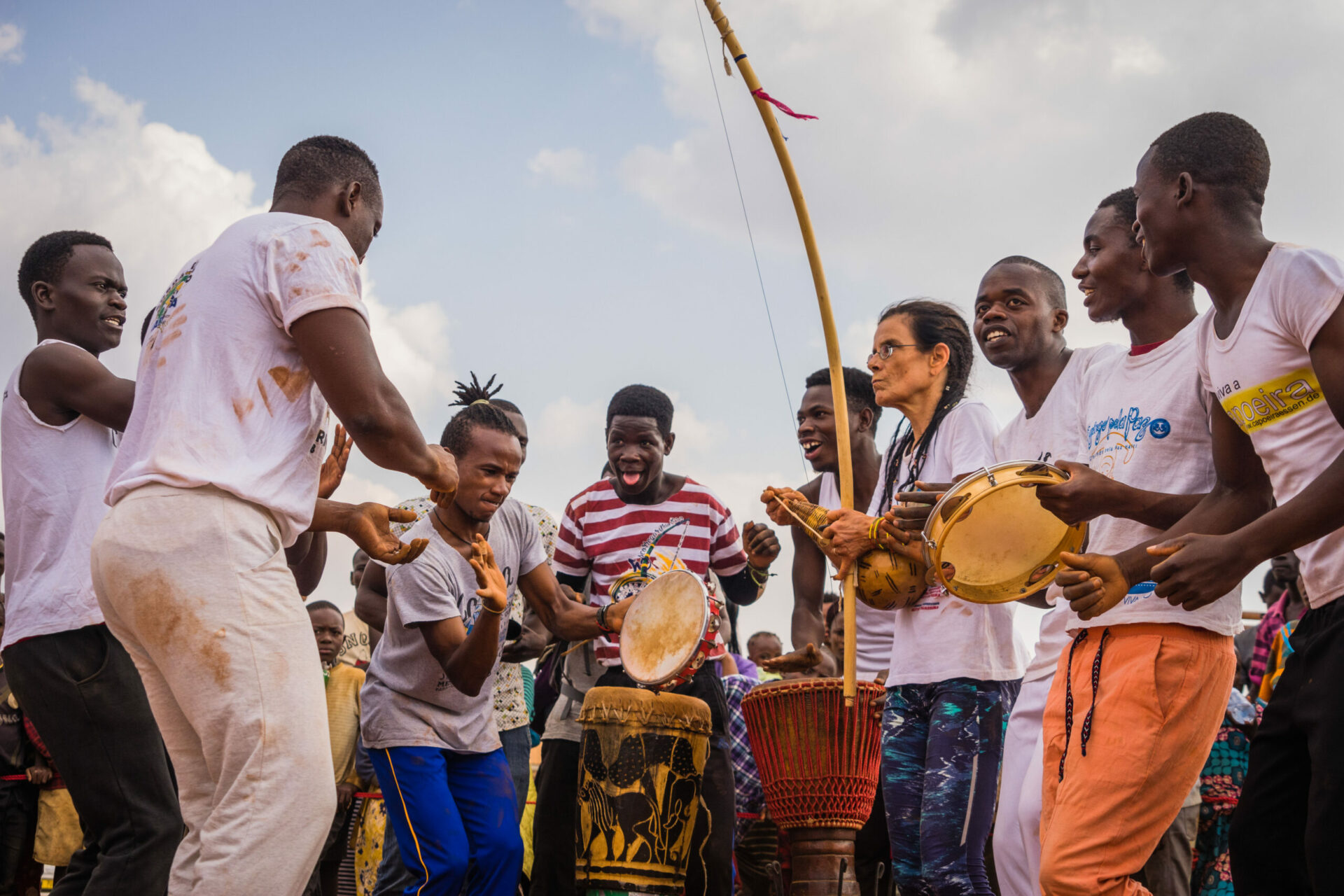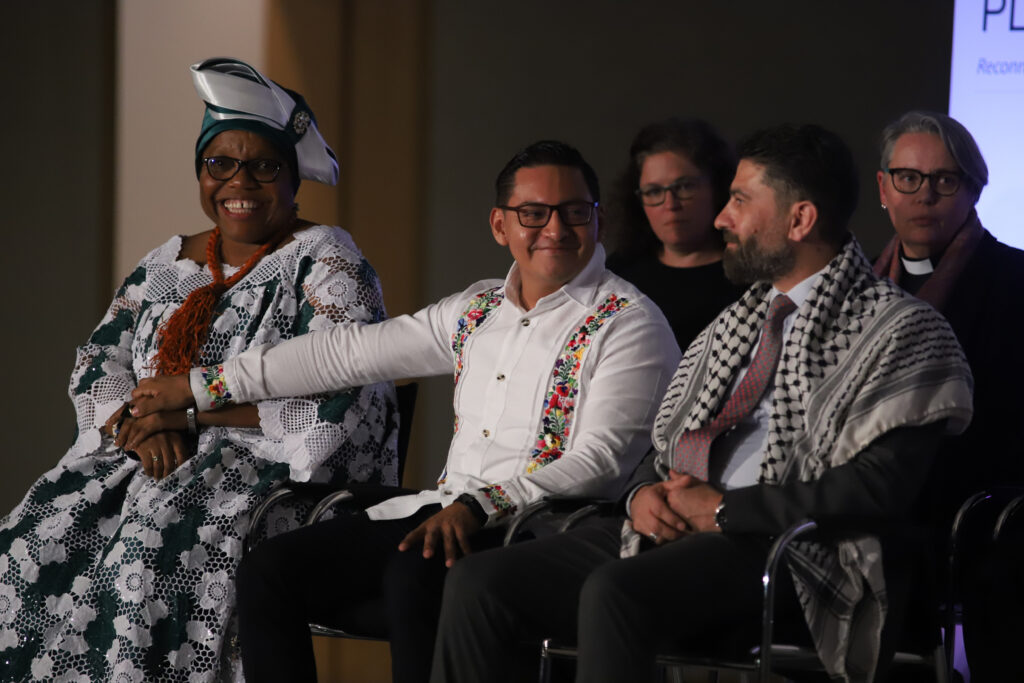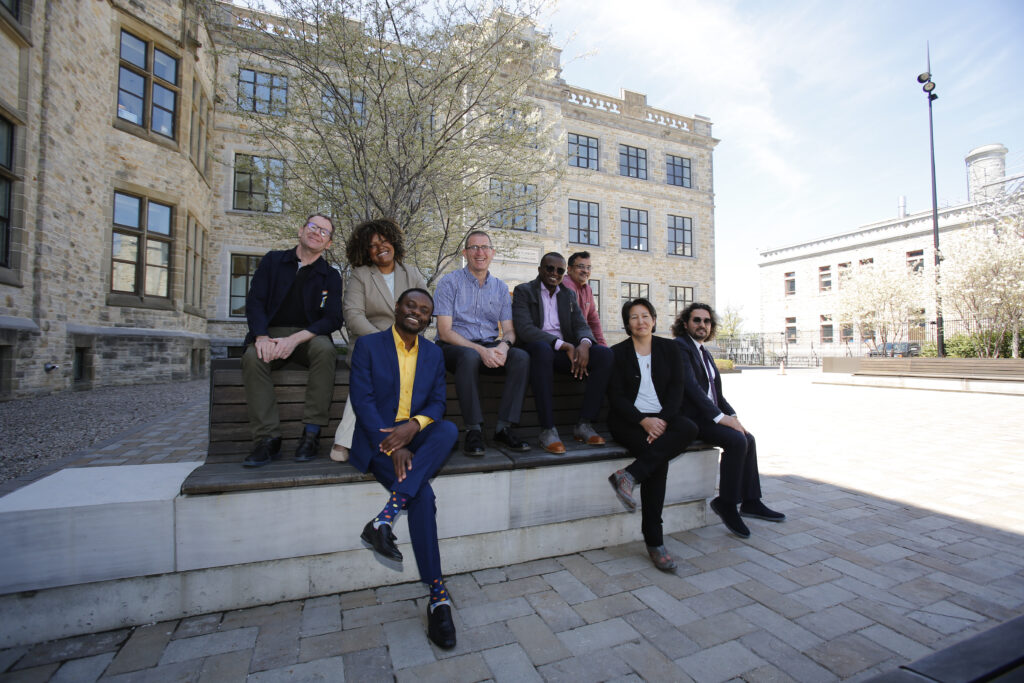

The Award
The Global Pluralism Award celebrates achievement and excellence in the field of pluralism.
Presented every other year to individuals, organizations, governments and businesses from around the world, the Award celebrates the inspiring and brave work that is helping to build more inclusive societies where diversity is valued and protected.

The Award is conferred by the Global Centre for Pluralism and made possible in part by the generous support of TD Bank Group. The Global Centre for Pluralism is an independent, charitable organization founded by His Highness the Aga Khan and the Government of Canada. The Centre works with policy leaders, educators and community builders around the world to amplify and implement the transformative power of pluralism.

The Award aims to
- Raise the international profile of pluralism, defined as a principle of respect for diversity.
- Identify and disseminate innovative and successful approaches to pluralism globally.
- Recognize and raise the profile of exemplary organizations, individuals or other entities seeking to advance pluralism.
Who is Eligible?
-
A wide range of disciplines
Candidates must demonstrate remarkable and sustained achievement in any of the wide range of disciplines related to pluralism. These disciplines include:
- Peacebuilding and Conflict Resolution
- Education
- The Arts
- Social Cohesion
- Migration and Integration
- Development
- Media and Technology
- Human Rights
Please note that the above is not an exhaustive list.
-
Global candidates
Candidates from any country are eligible, including:
- Individuals (artists, journalists, academics, policymakers, filmmakers, etc.)
- Civil society organizations (professional associations, faith-based organizations, labour unions, non-profit research or educational institutions, local community groups, non-governmental organizations, foundations, think tanks, etc.)
- Social enterprises
- Corporations
- Educational, research and policy institutions (public or private)
- Local/municipal, regional or federal/national branches or agencies of government
Please note that the above is not an exhaustive list.
-
Requirements
- Candidates must be living. The Award cannot be given posthumously.
- Candidates must not be an agency or employee of any of the Centre’s founding partners, namely the Government of Canada and the Aga Khan Development Network.
- Candidates must not be members of the jury, the Centre’s Board or staff or a consultant receiving remuneration from the Centre at the time of nomination. Close relations and organizations owned or operated by the jury, Screening Committee, the Centre’s Board members and staff are also non-eligible.
- Individuals and organizations nominated for the Award must not have been found guilty of committing violent crimes, terrorism, or other criminal activities; or have publicly held extremist views.
What is Pluralism?
Diversity in society is a universal fact; how societies respond to diversity is a choice. Pluralism is a positive response to diversity. It involves taking decisions and actions, as individuals and societies, that are grounded in respect for diversity. Those working towards pluralism recognize, value and respect diversity as a basis for more just, peaceful and equitable societies.
Pluralism is intersectional, considering multiple dimensions and expressions of identity to include race, ethnicity, indigeneity, religion, culture, language, neurodiversity, dis/ability, age, sexual orientation, gender identity and gender expression.

Pluralist societies go beyond simply including diverse peoples and communities into existing institutions and cultures. By embracing pluralism, societies make changes that lead to the recognition, belonging and full participation of every person. This allows people’s lives, communities and institutions to be enriched with new perspectives and ideas.
Because this touches all aspects of society, pluralism requires multi-dimensional efforts and leadership, from the local to the national to the transnational. Leadership for pluralism occurs therefore in multiple domains, including policy-making, inclusive citizenship, education, media, peacebuilding, interreligious dialogue, social entrepreneurship and the arts.
Read more about how the Centre understands pluralismFeatured Videos

2023 Global Pluralism Award Week

Jury Introduction to the 2023 Global Pluralism Award

2023 Global Pluralism Award Ceremony
The Award Jury
The Global Pluralism Award jury is comprised of international experts from various disciplines related to pluralism. Jurors have championed the values upon which the Award is founded: respect for human diversity and promotion of more inclusive societies.
Read the press release about the 2025 Global Pluralism Award jury here.
Dr. Marwan Muasher (Chair)
Jordan – Chair
Dr. Marwan Muasher
Vice President, Carnegie Endowment for International Peace
Marwan Muasher is vice president for studies at the Carnegie Endowment for International Peace. Most recently, he was senior vice president of external affairs at the World Bank from 2007 to 2010. Previous to that, Muasher served as foreign minister (2002–2004) and deputy prime minister (2004–2005) of Jordan. In 1995, Muasher opened Jordan’s first embassy in Israel, and in 1996 became minister of information and the government spokesperson. From 1997 to 2002, he served in Washington again as ambassador, negotiating the first free trade agreement between the United States and an Arab nation. He has authored two books, The Second Arab Awakening, published by Yale University Press in January 2014 and The Arab Center: The Promise of Moderation, also published by Yale University Press, June 2008. He served on the Global Centre for Pluralism’s Board of Directors from 2015 to 2019, and has served on the American University of Beirut’s Board of Trustees since 2007.
Ms. Reeta Roy
Canada / Rwanda
Ms. Reeta Roy
President and CEO, Mastercard Foundation
A values-based and entrepreneurial leader, Reeta holds nearly three decades of global experience across the private and philanthropic sectors. Today, she is the President and CEO of the Mastercard Foundation—one of the largest private foundations in the world, with approximately $40 billion in assets. Reeta has helped define the Foundation’s vision and strategies, instill a listening culture, and build a diverse and talented global team and network of partners. Under her leadership, the Mastercard Foundation has focused its work on Africa—where it is currently implementing its Young Africa Works strategy to enable 30 million young people to access dignified and fulfilling work by 2030—and serving young Indigenous Canadians through its EleV initiative. Overall, the Foundation has deployed over $6 billion to improve education, deepen financial inclusion, and build resilience in the wake of COVID-19. Prior to joining the Foundation, Reeta served as the inaugural Divisional Vice President of Global Citizenship and Policy at Abbott Laboratories and Vice President of the Abbott Fund, its corporate foundation. Reeta believes in the potential of philanthropy to drive impact at scale by listening first.
Ms. Yásnaya Elena Aguilar Gil
Mexico
Ms. Yásnaya Elena Aguilar Gil
Ayuujk linguist, writer, translator and Indigenous human rights activist
Born in Ayutla Mixe, Oaxaca, Yásnaya Elena Aguilar Gil is an Ayuujk linguist, writer, translator, and human-rights activist. She works with Ayuujk, Spanish and English languages. She is a member of COLMIX, a collective of young Mixe people who carry out research on Mixe language, history, and culture. In February 2019, she was invited to the ordinary session of the 14th Legislature in the Chamber of Deputies within the framework of the International Year of Indigenous Languages to give a speech in Mixe, in which she spoke about the condition of Mexico’s Indigenous languages. She has written for a variety of media in Mexico, including Letras Libres, Nexos, and Revista de la Universidad de México.
Mr. Antonio Zappulla
United Kingdom
Mr. Antonio Zappulla
CEO, Thomson Reuters Foundation
Antonio Zappulla is CEO of Thomson Reuters Foundation, the philanthropic arm of Thomson Reuters, where he spearheads impactful legal and media initiatives across 150+ countries. With expertise in organizational transformation and corporate strategy, Zappulla champions diversity & inclusion and is the founder of Openly, the world’s first global platform dedicated to LGBT+ stories. Recognized for his commitment to human rights, Zappulla was knighted as an Officer of the Italian Republic in 2022 and ranked first in the Financial Times’ OUTstanding list in 2018. Zappulla is a World Economic Forum agenda contributor, a One Young World Counsellor, and serves on several boards, including the Reuters Institute for the Study of Journalism at the University of Oxford. He holds a degree in Journalism a Masters in Middle Eastern studies, with Executive Education from the Stanford Graduate School of Business.
Dr. Comfort Ero
United Kingdom / Nigeria
Dr. Comfort Ero
President & CEO, International Crisis Group
Dr. Comfort Ero, International Crisis Group’s President & CEO since December 2021, brings over two decades of experience in conflict-affected regions globally. With expertise spanning conflict prevention, management, and resolution, she has played pivotal roles in mediating complex disputes and fostering peacekeeping efforts. Dr. Ero’s commitment to transitional justice has been evident throughout her career, reflected in her tenure as Deputy Africa Program Director for the International Centre for Transitional Justice. Additionally, her experience as a Political Affairs Officer and Policy Advisor to the UN Mission in Liberia underscores her proficiency in navigating the intricate politics and international relations of Africa. Holding a PhD from the London School of Economics, University of London, Dr. Ero is recognized as a leading authority in her field, contributing her insights to various boards and advisory bodies.
Mr. Gam Shimray
Thailand
Mr. Gam Shimray
Secretary General, Asia Indigenous Peoples Pact
Gam A. Shimray, a Naga from North-East India, is the Secretary General of Asia Indigenous Peoples Pact, a regional Indigenous rights organization with membership across 14 countries in Asia. He is a human rights activist who has been defending and promoting the rights of Indigenous Peoples for the past 30 years. His work has been mainly dedicated to advancing self-governance of Indigenous Peoples and democratic decentralization which intersects with creating a pluralistic society in Asia. He has also held several important positions at the national and regional levels in the field of Indigenous Peoples’ rights.
Dr. Stephen J Toope
Canada
Dr. Stephen J Toope
President and CEO, Canadian Institute for Advanced Research
Stephen Toope, President and CEO of the Canadian Institute for Advanced Research (CIFAR), brings a wealth of experience to his role. As the 346th Vice-Chancellor of the University of Cambridge, he made history as the first non-UK national to hold the position. His extensive career includes leadership roles such as Director of the Munk School of Global Affairs at the University of Toronto, President of the University of British Columbia, and the founding President of the Pierre Elliott Trudeau Foundation. Toope holds degrees from Harvard, McGill, and Trinity College, Cambridge. His notable public service includes chairing the United Nations Working Group on Enforced and Involuntary Disappearances and serving as a Fact Finder for the Commission of Inquiry into the Actions of Canadian Government Officials in relation to Maher Arar. Toope is an accomplished author and lecturer in international law, with publication(s) and speaking engagements worldwide. He has received several honors, including being elected to prestigious institutions such as the Institut de droit international and receiving honorary fellowships and awards from academic institutions in both Canada and the UK. Toope is a Fellow of the Royal Society of Canada and an Officer of the Order of Canada.



